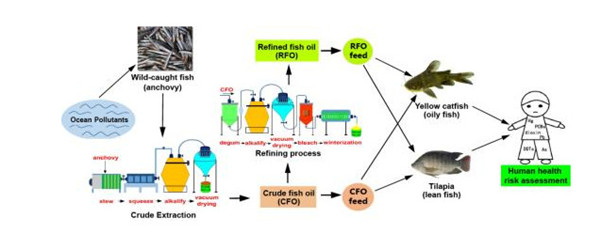Fish oil feed as an organic pollutant in the body of farmed fish has been traced for the first time in the world by the School of Life Sciences of East China Normal University, in collaboration with other research institutions at home and abroad.

Fish oil is an important component of the feed for many farmed fish. As marine pollution becomes increasingly serious, fish oil directly extracted from marine fish often contains a variety of pollutants. Exploring the transmission of marine pollutants into the human body and scientifically assessing the food safety of farmed fish has therefore become a major concern for scientists.
In this research, the content of various heavy metals and organic pollutants in the muscles of yellow catfish and tilapia were measured. They had been fed for 8 weeks with refined fish oil and crude fish oil extracted from the anchovy purchased from the fish farms of the Bohai and Yellow Seas. Then the cancer risk for humans who ate this farmed fish was assessed.
According to the results, fish oil feed is a key source of the pollutants in farmed fish and fish nourished by crude fish oil could even lead to a higher risk of cancer in humans than those fed by refined fish oil.
There was no whole-process tracking of marine environmental pollutants entering the human body through the fish that are fed with fish oil. The study is a reminder for government regulators and feed manufacturers that they should gradually limit and ultimately prohibit the use of crude fish oil as a feed for aquatic farming.
